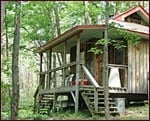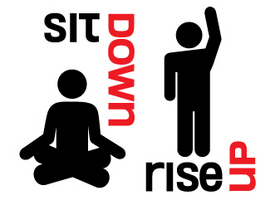
by Davee Evans
What kind of livelihood works best for a contemplative practice? To afford more meditation retreat time, I switched from full time employment to freelancing; and over the last four years my plan has partially succeeded, but it’s been more difficult than I expected and longer retreats have surprisingly been harder to pull off. I’d recommend the approach with some caveats, for those in a line of work that has a freelance community.
I was on a longer retreat in 2006, and worrying out load if I should be working and saving for my retirement instead. An older, wiser fellow named Alan offered that more retreat time meant that I needed a LOT less stuff when I retired. You know, becoming an unattached Buddhist and all doesn’t require serious shwag. So retreat was better than a 401(k) plan, he pined. And he seems to be living that truth. But I’m trying to be responsible too, might need to pay for my kids’ college someday – if I ever have kids. So I’m still trying to keep the career going instead of working at a retreat center for good.
At least one Rinpoche recommended we Buddhists start our own businesses, to have more flexibility for deep retreat. If you’re the top chef then you can set your own schedule. But for most of us, I still wonder if contemplative Buddhism in the West is possible, given how busy we all are. In more traditional settings, monks and nuns do a whole hell of a lot more sitting. Do you think deep contemplative traditions are really tenable here?
On the down side, freelancing I felt like I had less say in what I was contributing to. But that’s perhaps like any full time work. If work is scarce, there are less options and one might end up working for big oil, but if work is more plentiful one can pick and choose more positive projects. But in this economy I should perhaps be more concerned about finding any stable job instead of a specific kind. I have more friends out of work then ever before. And if you’re struggling to find work, who has the mindset to go on retreat?
My latest prayer: “May all beings find sustaining and fulfilling work.”
That same anxiety and restlessness looking for work was my ongoing experience freelancing. When I had work, I was worried about what was next. Then in between contracts, that was doubled. It would range from a nagging feeling that I was being foolish to irrational anxiety and thoughts like, “That was it; I’ll never find another decent chunk of work.” If I went on a meditation retreat while between contracts, that would steal my mind away. An interesting set of emotions to work with for sure — and maybe i’ll be accomplished enough someday to make better use of that — but for now disquiet.
I suspect Jamgon Kongtrul’s advice for retreats – make sure you’re safe, he wrote – holds true both physically and also financially. He was talking about both bears and bear markets.
Some things that I’d recommend if you try a similar approach:
- Save more, spend less. My anxiety level was proportional to how much of a financial cushion I had to fall back upon during gaps.
- Schedule retreats into longer contract terms, and negotiate that up front when preparing the contract. This doesn’t work for short projects, but longer ones you can slip a week or two into the middle; then head into retreat knowing that there is work waiting for you on the other end. That worked the best for me.
- Stay in touch with former coworkers, and let them know your plan. The majority of my clients have been referrals or former coworkers.
- Try out freelance clearinghouses like elance.com, those specific to your specialty, or the new HireMe.tv even.
This work style has helped make retreat more possible compared to the typical American vacation allotment. I’m jealous of teachers who can swing a whole summer off, or Europeans who might get six weeks a year for retreat. So if two weeks of standard vacation isn’t enough for your retreat aspirations or those combined with some regular vacation with our non-practicing partner (who can’t fathom why you might spend all of your available vacation sitting on your rear) then give freelancing a shot.

